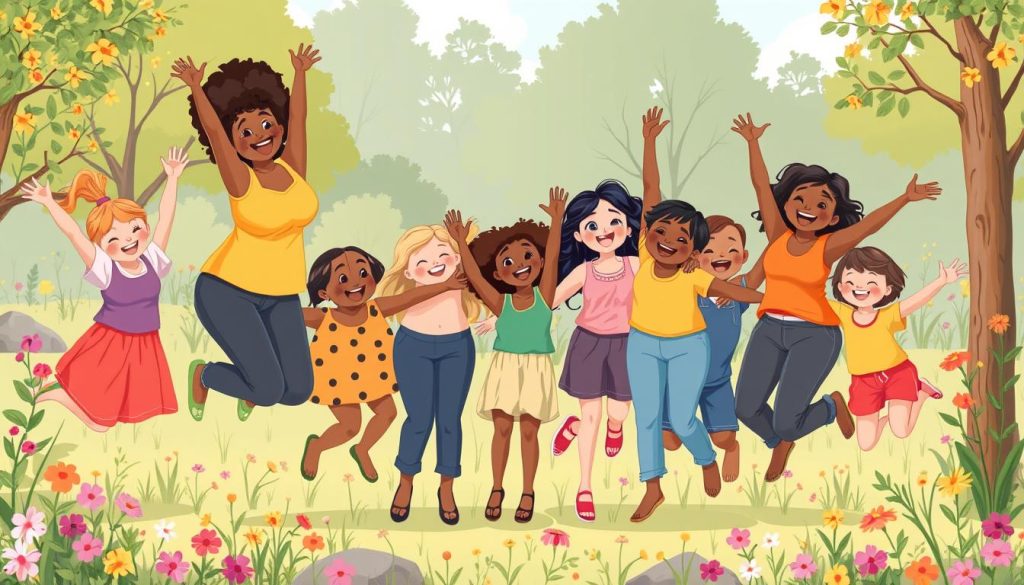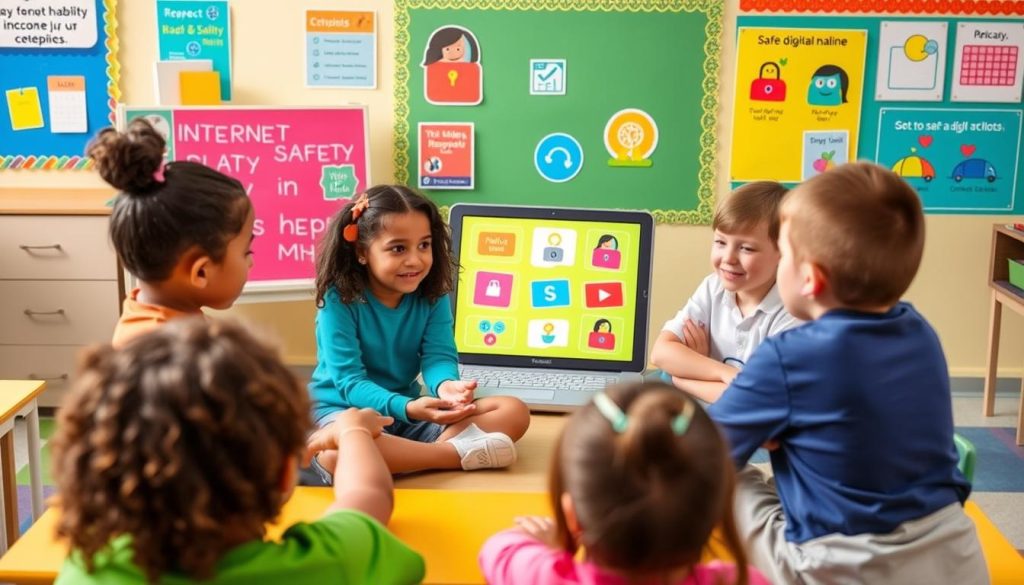Do you worry about talking to your child about puberty? You might think it will be awkward. But, research shows starting early and being open can really help. Dr. Elise Berlan, an Adolescent Medicine expert, says these talks are key for understanding health and wellbeing.
Starting these talks when your child is 8 or 9 can make things easier. Gentle parenting and teaching consent early on helps. Being open about these changes also boosts your child’s self-esteem during this big change.
Key Takeaways
- Early puberty conversations are essential, with many parents noticing signs of puberty around age 9.
- It’s beneficial to start puberty-related discussions early, around the average age of 8 or 9.
- Understanding the science behind puberty helps reduce shame and confusion in children.
- Using correct anatomical vocabulary is crucial for children’s protection and understanding.
- Open discussions about topics like menstrual hygiene and spontaneous erections are important.
- Positive hygiene routines and independence in self-care are vital during puberty.
- Awareness and management of body odor are essential aspects of puberty hygiene.
The Importance of Starting Puberty Conversations Early
Starting talks about puberty early is key in today’s world. Kids see a lot about sex and relationships online and on TV. Parents need to guide them with the right facts. Dr. Berlan says not all online info is true, so talking early is important.

Why Early Conversations Matter
Talking about puberty before it starts helps kids get ready. This is usually around 8 or 9 years old. It helps them deal with the anxiety that comes with these changes.
Girls might start to develop breasts in second or third grade. Boys might get gynecomastia too. Early talks help them understand these changes.
Setting the Stage for Ongoing Dialogues
Starting these talks early helps keep the conversation going. It makes talking about body changes and feelings normal. This creates a safe space for kids to ask questions and share their feelings.
Addressing Media and Online Influences
In today’s digital world, it’s vital to talk about media’s impact on kids. Discussing screen time and online content is key. Teaching kids to think critically about what they see online helps them find reliable info.
When and How to Talk to Your Child about Puberty
Puberty is a big change in your child’s life, with both physical and emotional shifts. Knowing when and how to talk about it is key, especially in families with stepchildren or those that have remarried. Talking about it well can build trust and help your child feel ready and supported.
Recognizing the Signs of Puberty in Girls
It’s important to know when girls start puberty. Signs like pubic hair, breast changes, and menstruation usually start between 8 and 14. Since these changes can vary, especially in families that have divorced, it’s good to be ahead of it. Dr. Elise Berlan says to use moments like bath time to talk about bodies and how they work.

Recognizing the Signs of Puberty in Boys
Boys usually start puberty between 9 and 15, with signs like bigger testicles, voice changes, and more hair. This time can also be when middle child syndrome is more noticeable. Dr. Karen Donaldson recommends talking about these changes as they happen, in everyday life. This helps kids understand and feel less shy.
Tips for Breaking the Ice
Starting a conversation about puberty can be tough. Using books and media can help a lot. “It’s NOT the Stork!” by Robie H. Harris and “What Makes a Baby?” by Cory Silverberg are great for starting talks. Also, being careful about what kids see online is important, as 60% of 11- to 13-year-olds stumble upon adult content. In families that have remarried, making sure everyone agrees on these talks is key to a united family.
Common Questions Kids Have about Puberty
As kids enter puberty, they have many questions about their body changes. It’s important to answer these questions with facts. This helps kids feel good about their bodies and eases their worries.
Managing Body Changes
Kids often worry about the physical changes they go through. Girls usually start puberty between 9 and 14, and boys between 12 and 16. Girls develop breasts, and some boys may get gynecomastia.
Teaching kids about hygiene is key. This includes bathing regularly to avoid body odor and oily skin.

Understanding Menstruation and Nocturnal Emissions
Many girls are nervous about getting their period, which starts around 12 in the U.S. But it can start as early as 8 or as late as 16. Boys might wonder about nocturnal emissions, a natural part of puberty.
Talking openly about these topics helps. It makes kids feel more comfortable and supports a positive view of themselves.
Tackling Questions About Growth and Development
Kids often ask about growing taller, changes in genital size, and how they develop. It’s crucial to explain that everyone grows differently. This helps kids feel okay about their own growth.
Activities like coaching sports are great for kids. They help with physical growth and provide a healthy way to release energy.
Using eco-friendly parenting helps create a supportive environment. Talking openly about drugs and emotional changes is also important. It helps kids navigate puberty positively.
Role of Schools and Healthcare Providers
Schools and healthcare providers are key in teaching kids about puberty. They give accurate info and help kids understand important topics. Parents should work with teachers and doctors to cover all bases, especially about social media, eating disorders, and anxiety.
The World Health Organization says 93 million kids under 14 face developmental delays or disabilities worldwide. Schools and healthcare must work together to help every child learn. Kids with health insurance get better care and do better in school and life.

Schools and healthcare do more than just talk about puberty. They help kids grow emotionally and physically. Doctors offer private talks where kids can share concerns about eating disorders and get advice.
Money can be a big problem for health care, especially for poor families. They might skip doctor visits, hurting their kids’ growth and school success. Family setup, like single parents or kids with grandparents, can also make it hard to get care. Different cultures and races add to the challenge, making it key for doctors to talk in a way that works for everyone.
Having doctors in rural and poor areas is very important. They help kids get the care they need for a better future. Studies show that kids with access to healthcare do better in school and feel better emotionally and physically.
Studies on hospital readmissions and school programs show how important teamwork is. Working together helps manage health issues and creates a supportive learning space. This helps kids grow up well-rounded and healthy.
Parenting Challenges: Navigating Emotional and Physical Changes
Parenting during puberty is unique. Your child goes through big emotional and physical changes. Knowing how to support them is key.
Offering Reassurance and Support
Adolescence brings a mix of emotions and questions. It’s important to offer reassurance and support. Practical tips include regular check-ins and open communication.
A Pew Research study found 53% of fathers wish they spent more time with their kids. Online family therapy can help improve communication and offer expert advice.
Promoting Body Positivity and Self-Esteem
Boosting body positivity and self-esteem is vital. Boys and girls may feel self-conscious about changes like height and weight. Talking about these changes positively can help.
Providing accurate information and support boosts confidence. Encouraging a healthy self-image is crucial at this stage.
Creating a Comforting Environment for Questions
Creating a safe space for questions is important. Adolescents want independence but also need reassurance. Answering their questions patiently helps ease their worries.
Discussing puberty, friendships, and peer pressure helps too. Online family therapy can offer more guidance in creating a supportive home environment.
Conclusion
Talking to your child about puberty early can make these conversations easier. Starting open talks early helps you keep talking about changes in their body and feelings. This approach is backed by research showing how important parents are for their kids’ success (Jeynes, W., 2012).
Fathers, in particular, have a big impact on their children’s growth and emotional well-being (Lamb, M.E., 2004; Ramchandani et al., 2013).
Teaching your child to love their body and reassuring them often is crucial. Working with doctors and learning from educational resources helps you give accurate advice. Programs like Nutrition Detectives™ show how to teach healthy habits to kids and parents (Katz et al., 2011).
This approach helps remove obstacles and builds support for everyone (Katz et al., 2007).
Puberty brings many challenges, but your caring and knowledgeable help can help a lot. Talking about anxiety or drugs in the context of puberty makes your child feel safe to ask anything. Using eco-friendly and budget-friendly parenting strategies helps raise well-rounded kids. By building trust and understanding, you prepare your child for the future and strengthen your family bond.
FAQ
When is the best time to start talking to my child about puberty?
How can I make conversations about puberty less awkward?
How do I address misinformation my child might get from the internet or media?
What are some signs of puberty in girls and boys?
How can I keep the dialogue about puberty ongoing?
How do I teach my child about body positivity during puberty?
What are common questions kids have about puberty?
How can schools and healthcare providers support children during puberty?
What if my child feels anxious about the changes they are experiencing?
How can I handle parenting challenges related to puberty?
This post contains affiliate links. If you click on a link and make a purchase, I may earn a small commission — at no extra cost to you. Thank you for supporting this blog and helping me keep the patterns free! Read the full Affiliate Disclosure & Transparency.
